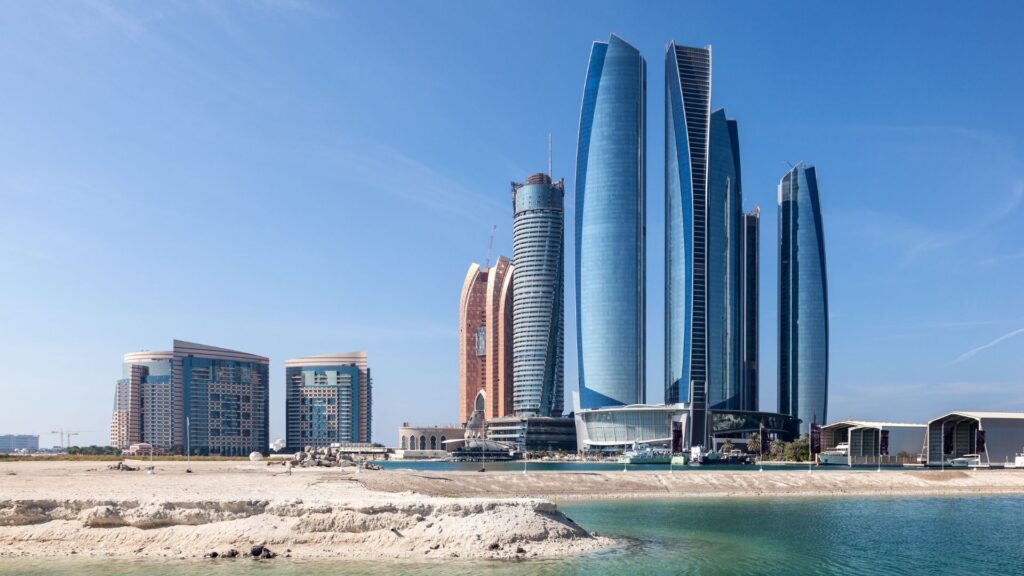If you’re interested in purchasing property in Abu Dhabi, you’re in luck!
You can buy real estate property in Abu Dhabi with cash, but there are a few rules and restrictions you need to be aware of.
In the guide below, we will answer all of your questions and give you all the info you need to buy real estate in Abu Dhabi with cash.

Abu Dhabi is one of the most sought-after cities for real estate investment in the UAE, and for good reason. With its robust economy, modern infrastructure, and luxurious way of life, it’s no wonder so many people are drawn to the city to buy property.
When it comes to property ownership in Abu Dhabi, there are two main options – freehold and leasehold. Freehold ownership gives you full ownership of the property and the right to use it for as long as you like. On the other hand, leasehold ownership involves a lease agreement between you and the government, which restricts the amount of time you can use the property.
If you’re looking to purchase property in Abu Dhabi, it’s important to have a solid understanding of the local property market and regulations. This includes getting a No Objection Certificate (NOC) from the Abu Dhabi Municipality, which is a crucial step in all property purchases in the city. Even if you’re paying cash, it’s also recommended to get a mortgage pre-approval from a local bank. This will help you get a better idea of the total costs involved in the purchase, including closing costs and other fees.
When you buy property in Abu Dhabi with cash, you need to be aware of the payment process. Typically, you’ll need to make a deposit of 10% of the total property value, and the remaining 90% will be paid when the sale is complete. It’s crucial to make sure the payment process is secure and transparent, and that you understand all the terms and conditions of the sale.
Another thing to keep in mind is the taxes and fees associated with purchasing property in Abu Dhabi. These could include transfer fees, registration fees, and property taxes. These fees are usually paid by the buyer, so it’s important to have a clear understanding of the total cost of the property before making a purchase.
So it’s definitely possible to buy property in Abu Dhabi using cash. However, it’s important to familiarize yourself with the local property market and regulations, and to follow the necessary steps to make sure the purchase is secure and transparent. With its strong economy, modern infrastructure, and luxurious way of life, Abu Dhabi remains a popular destination for real estate investment.

Buying A Real Estate Property In Abu Dhabi: Cash vs Mortgage – What Is Better?
When it comes to buying a property in Abu Dhabi, it’s a big step both financially and emotionally. Whether you’re a first-time homebuyer, seeking an investment opportunity, or in search of a new place to call home, there are two main options for financing your purchase – cash or mortgage. Both options come with their own set of benefits and drawbacks, so it’s crucial to consider your financial situation and long-term goals before making a choice.
Paying cash for a real estate property in Abu Dhabi has its advantages. Firstly, you can avoid paying interest on a mortgage, which can add up over the years. With no mortgage payments, you’ll have more disposable income each month that you can use to improve your property or pay down other debts. Additionally, paying cash can simplify the buying process, as you won’t need to go through the time-consuming and stressful process of applying for a mortgage.
However, paying cash also means coming up with a large sum of money upfront. This can mean saving for years or liquidating other assets, such as stocks or bonds, which can impact your financial stability. Additionally, paying cash can decrease your liquidity, leaving you without enough funds for unexpected expenses or emergencies.
On the other hand, taking out a mortgage to buy a property in Abu Dhabi has its benefits. A mortgage allows you to purchase a property with a smaller upfront payment, making home ownership more attainable. Additionally, the interest paid on a mortgage is tax-deductible, providing you with tax benefits.
But there are also disadvantages to taking out a mortgage. You’ll be paying interest on the loan, which can add up over time. Mortgage payments can also be a significant part of your monthly expenses, limiting your financial flexibility. Furthermore, if property prices drop, you may end up owing more on your mortgage than your property is worth, known as being “underwater.”
So, when choosing between paying cash or taking out a mortgage, it’s crucial to consider your financial situation and long-term goals. If you have a substantial amount of cash saved and a low debt-to-income ratio, paying cash may be the way to go. On the other hand, if you don’t have the funds to pay cash or are concerned about reducing your liquidity, a mortgage may be a better fit.
Buying real estate property in Abu Dhabi is a big decision that requires careful consideration of your financial situation and long-term goals. Whether you opt for cash or mortgage, it’s important to understand the advantages and disadvantages of each option. By weighing the pros and cons, you can make an informed decision that aligns with your financial goals and helps you achieve your dream of owning a home in Abu Dhabi.

Rules For Buying Real Estate Property in Abu Dhabi With Cash For Foreign Investors
As a foreign investor, buying property in Abu Dhabi can be a great investment opportunity. However, there are certain rules and regulations that you need to be aware of before making a purchase. In this article, we will go over the main rules for foreign investors when buying properties in Abu Dhabi.
Freehold vs Leasehold:
When it comes to buying property in Abu Dhabi, foreign investors have two options – freehold or leasehold. Freehold properties give the buyer ownership rights for their lifetime, while leasehold properties are only for a fixed period of time, usually up to 99 years.
Eligibility Criteria:
In order to purchase a property in Abu Dhabi, foreign investors must meet certain criteria. This includes having a valid passport, being over 21 years old, having a good financial standing, no criminal record, and proof of income.
Choosing the Right Property:
When selecting a property, it’s important to pick one in a well-established area with good infrastructure and transportation links. This will make it easier to rent out the property and increase its resale value.
Property Valuation:
Before making a purchase, it’s a good idea to have the property evaluated by a professional appraiser. This will help determine its fair market value and prevent overpaying.
Due Diligence:
Before finalizing the purchase, it’s crucial to do due diligence on the property. This includes checking the title, ensuring it’s free from legal issues, and verifying the quality of the construction.
Purchase Agreement:
Once you’ve selected a property, you’ll need to sign a purchase agreement that outlines the terms of the sale, such as the purchase price, payment terms, and any contingencies. It’s recommended to have a lawyer review the agreement to make sure it’s in your best interest.
Property Transfer:
After the purchase agreement is signed, the property transfer process can start, which involves transferring ownership from the seller to the buyer. This process can take several weeks and may include additional fees such as stamp duty and registration fees.
Property Insurance: After the transfer is complete, it’s important to get property insurance to protect your investment in case of any unforeseen events like damage to the property or theft.
So if you are looking to buy real estate property in Abu Dhabi with cash as a foreign investor – it can be a very rewarding and profitable investment. However, it’s important to be familiar with the rules and regulations and to take the necessary steps to ensure a successful purchase process. By following these guidelines, you can make sure your investment in Abu Dhabi’s real estate market is a smart one.

Should I Buy Real Estate Property with Cash In Abu Dhabi?
Whether to buy real estate in Abu Dhabi using cash or taking out a mortgage is a personal choice that depends on your financial situation, goals, and priorities. When making this decision, here are some factors to consider:
Liquidity:
Paying with cash means that you own the property outright and won’t have to make regular mortgage payments. This can be beneficial if you have a lot of liquid assets, freeing up cash flow for other investments or expenses.
Interest Rates:
If you opt for a mortgage, the interest rate will affect your monthly payments and the overall cost of the loan. If interest rates are low, it may be more advantageous to finance the purchase with a mortgage instead of using all of your cash.
Investment Strategy:
If you are buying real estate as an investment, paying with cash gives you the potential to benefit from future price appreciation. Plus, rental income from the property can help recover some of your initial investment over time.
Risks:
Real estate investment always comes with some level of risk. Paying with cash ties up a large portion of your assets in a single investment, which can be risky. However, financing the purchase with a mortgage spreads the risk across multiple assets.
Future Financial Goals:
If you have other financial goals like saving for retirement or your children’s education, it may be more advantageous to keep your cash available for these goals instead of using it to buy real estate.

So, There You Have It!
As you can see, both cash and mortgage have their pros and cons for buying real estate in Abu Dhabi. It is essential to carefully evaluate your financial situation, goals, and priorities and seek professional advice before making a decision.
